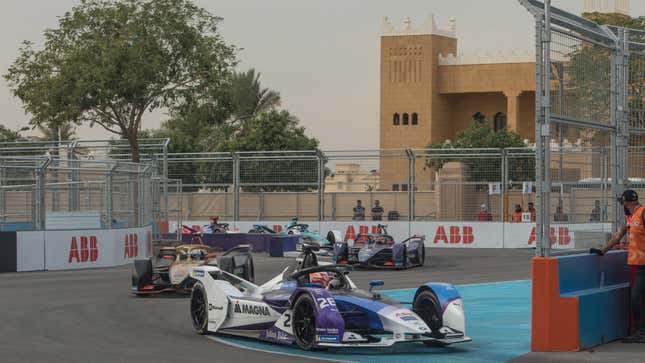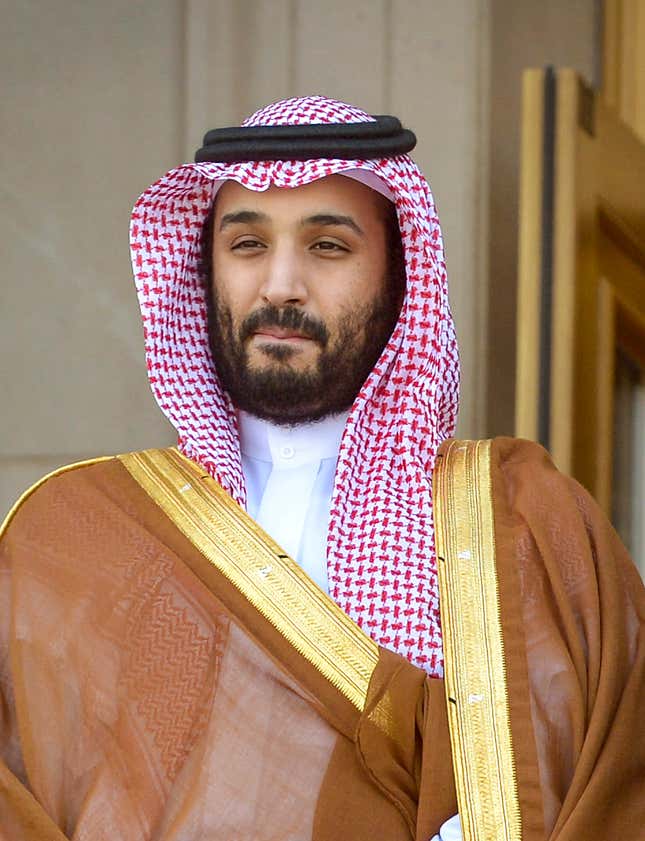
Yesterday, British driver Alexander Sims took home his first Formula E win for BMW in the season opener in Diriyah, Saudi Arabia. It’s great news for Sims and a huge stage for one of the fastest-growing racing series in the world. But it’s hard to focus on motorsports when it’s clear that’s all just part of a whitewashing effort to help the country rebrand itself, even as it represses its citizens and even murders them.
We’ve already taken a look at some of the implications of hosting Formula E in Riyadh when it was announced back in May 2018. Since then, however, Saudi Arabia has faced an even bigger international backlash over the state-ordered murder of Washington Post journalist Jamal Khashoggi.
Despite said backlash, however, Formula E went back again this weekend for the season opener. Formula E is working to establishing itself as a formidable presence in a kingdom built on petroleum, and that’s on purpose.
The electric single-seater series is yet another in a long line of sporting events scheduled in Saudi Arabia as part of a comprehensive public relations campaign aimed at normalizing the kingdom as Crown Prince Mohammed Bin Salman (known as MBS) consolidates control, despite widespread humanitarian concerns.
Broadly speaking, this project is called Vision 2030 and it’s a lot more than just electric car races. The crown prince began the program with the assistance of Western consultants to shift the country away from its reliance on petroleum reserves. The basic idea is to use the windfall from the forthcoming yet continuously delayed initial public offering for Saudi Aramco, the state oil company, to fund an onslaught of development projects and PR endeavors aimed at opening a new chapter for the kingdom.
You might be familiar with some of the other efforts in this approach to changing the conversation about Saudi Arabia already. Our sister site Deadspin (a good website) covered the saga of the WWE’s series of events in Saudi Arabia and the overtly political content of the shows. They also discussed how the WWE events fit into the broader context of the Vision 2030 plan along with other sporting events, just like Formula E race this weekend and the Dakar Rally next year.

The crown prince’s efforts to make a pivot away from Saudi Arabia’s image as a repressive petrostate aren’t happening in a vacuum, of course. As he took control of the country from his father King Salman last year, the crown prince has jailed opponents, run a brutal war in Yemen (with the assistance of the United States), and been implicated in organizing the aforementioned murder of Khashoggi.
Yet the crown prince has indeed enacted some reforms at home as part of his campaign. Women can drive there now, and Reema Juffali was actually the first Saudi woman to race in an international series in the Jaguar I-Pace spec race that accompanied the Formula E event. The kingdom is eager to show itself and the changes it has made off to visitors and is aggressively (if not all that successfully) promoting a new visa program targeted at tourists.
Against the backdrop of the controversies surrounding Saudi Arabia, the Formula E race represents a recommitment of Western organizations to cooperate with the kingdom’s efforts to reframe itself in foreign eyes. Speaking to Vanity Fair last year, series founder Alejandro Agag specifically thanked the crown prince himself for facilitating the first race.
Of course, Saudi Arabia isn’t the only country with a repressive record to use motorsport to try and reframe the conversation. Azerbaijan and Apartheid South Africa did it with the help of Formula One. The Peróns of Argentina enlisted racing legend Juan Manuel Fangio in their PR efforts too.
But Saudi Arabia is employing this tactic on an even bigger scale. They don’t just want one racing series. They want them all. Formula E, Formula One, Dakar. They’re aiming to bring them all to the kingdom.
Despite the moral complications surrounding events designed to recast the image of an authoritarian state, there is one important consideration to make. Journalists will be there and, if they’re worth a damn at all, they’ll be asking hard questions. Last year at the first Formula E race, PBS reporter Martin Smith was there and managed to track the crown prince down for a few questions. It was part of that interview that he went on the record about the killing of Khashoggi for the first time. That’s significant.
Reporters Without Borders ranks Saudi Arabia 172nd out of 180 countries examined as part of its World Press Freedom Index this year. Until things really change in the country, events like Formula E might be some of the only chances to ask frank questions of Saudi officials and get them on the record about the important issues. It is, simply put, the least they can do as they watch the cars go fast.
Sports can, in fact, shed light on injustices and change the world of the better. That can only happen here if no one gives Saudi Arabia a pass for its actions—no one should let anyone forget who MBS is and what his country does.
In any case, it seems like motorsport will continue to be a part of Saudi Arabia’s agenda. Dakar is coming next year and Formula One may follow shortly after that. Chances are, the policies of the Saudi government will not change between now and then. People will die in Yemen because Saudi Arabia continues to strike civilians there. Saudi citizens and residents will continue to be subject to repressive restrictions on their everyday lives, and MBS will continue to spin it as the country’s post-oil resurgence.
We can only hope that each of these events is accompanied by journalists who won’t just be looking at the cars but will make sure to ask the right questions to the people in charge as well. Otherwise, what’s the point?